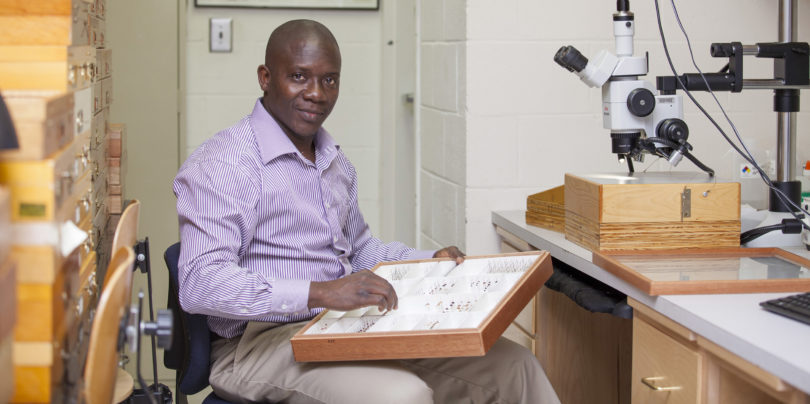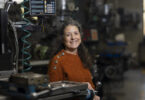Thanks to a Fulbright Scholarship and the advice of a UGA alumnus working in Africa with the Peace Corps, Brad Hounkpati ended up on campus for intensive study of his favorite insect, the African ladybeetle.
Hometown:
Aneho, Togo, West Africa
High School:
Lycée de Zébévi-Aného (LYZA)
Degree objective:
Ph.D. in entomology with a research focus on African ladybeetles
Other degrees:
Master of Science in agronomy, 2005
Expected graduation:
Summer 2016
University highlights, achievements, awards and scholarships:
— Fulbright Scholarship through the Institute of International Education.
— Fellowship award from the Norman E. Borlaug Leadership Enhancement in Agriculture Program for field research in Africa.
— Served as Fulbright liaison for the Institute of International Education for new Fulbright grantees from Togo. I coordinated communication between students and their respective host universities in the U.S.
— Fundraising co-chair for the Graduate Students and Postdocs in Science.
— Volunteer for the Entomological Society of America.
— Consulted and assisted with editing and translating working papers for African Forest Forum.
— Author or co-author of seven published academic papers.
Current Employment:
I am a graduate teaching assistant in the entomology department, and I’m founder and CEO of Grain de Sel Togo Inc., a nonprofit organization providing scholarship and technical support to underprivileged students of public universities in Togo, West Africa.
Family Ties to UGA:
No family ties to UGA.
I chose to attend UGA because…
… of the International Fulbright program. A few weeks after my Fulbright Award notification, I received admission offers from various universities. Because they wanted to make sure I attended the university of my dreams, they asked me if I would wanted to go to UGA. But at that time, I had no idea about UGA. I asked U.S. Peace Corps volunteers in Togo and it turned out that two of them graduated from UGA. I still remember what Adam Smith (now a returned Peace Corps volunteer) told me: “Hey Brad, UGA is my hometown university where I graduated from. It is definitely the best place for your research in entomology. Just go ahead and say yes to Fulbright so they complete your admission and when you do, let me know and I will connect you with my friends.” So I replied back to both my major adviser and Fulbright placement officer, and here I am today.
My favorite things to do on campus are…
I love to collect insects around campus and be part of any bug-related outreach event where I can chat with people—and I actually like talking to people who fear insects.
When I have free time, I like…
… to spend time with my family and work for my nonprofit organization, Grain de Sel Togo Inc., as well as travel.
My favorite place to study is…
… my “oval office” from the comfort of my apartment or in the Beetle Systematics and Morphology lab.
My favorite professor is…
… Joseph V. McHugh, my academic adviser. My very first contact with him was through email in which he described his work and how he runs his lab: “Congratulations on being selected for a Fulbright Scholarship. Good luck with your plans to study insect systematics in graduate school. I hope that you carefully consider the possibility of coming to study at the University of Georgia. I think that you would be a very good fit here.” I immediately felt that my future was in his lab because his description fit so well with my expectations, and it was very interesting and amazing to see a dream being fulfilled after waiting for six years.
We used to call our advisers by their title, and I was really surprised when he told me to simply call him Joe, which was difficult for me at the beginning. But as time went by, I became more used to it. More importantly, he is so humble and friendly with everyone.
Academically, I expected him to tell me what to do and I was surprised when he said to come up with my own projects. My only plan was to study African ladybeetles. I contacted ladybeetle specialists to find opportunities that would allow me to get my fieldwork done in Africa. All of them appreciated my ideas but diplomatically discouraged me about embracing such a region because finding a funding source might be difficult.
At this point, I decided to save money to fund preliminary fieldwork in two West African countries, Benin and Togo. Three months later, I had my first committee meeting, and all the members accepted my projects, pending funding. I spent nights and nights looking for funding and, lucky me, I found a call for travel grants from the West African Research Association. I quickly prepared my application and Joe stood by me through the process and our project was accepted and funded.
Building on this success and after a meeting with Carolina Robinson and Victoria Collins McMaken of Global Programs in the College of Agricultural and Environmental Sciences, I learned about the Borlaug LEAP and both were convinced that my project would be accepted. At my big surprise, I just recently received the Borlaug LEAP Fellowship award.
In short, without the support of the resourceful and amazing people here at UGA, these achievements, which are just the beginning of my journey, would not have been possible. Joe is more of a friend you can trust and rely on than a professor.
If I could share an afternoon with anyone, I would love to share it with…
… my ladybeetles—they are the “fuel of my graduate school vehicle.”
If I knew I could not fail, I would…
… never give up, even in very hard situations.
If money was not a consideration, I would love to…
… give the little money I have to those in need.
After graduation, I plan to…
… serve as regional ladybeetle taxonomist in West Africa to sustain implementation and management of integrated pest management programs emphasizing biologically based control strategies. I will be the regional expert in beetle systematics and reinforce education and outreach activities in entomology.
The one UGA experience I will always remember will be…
… being given a chance to create my research projects and the time I spent in our lab.






